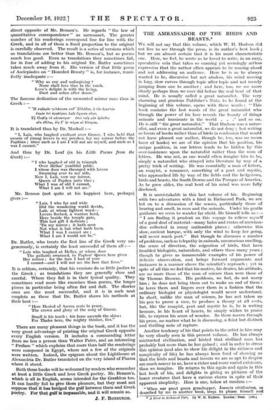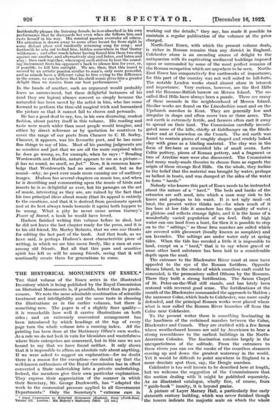THE AMBASSADOR OF THE BIRDS AND BEASTS.* WE will not
say that this volume, which W. II. Hudson did not live to see through the press, is its author's best book ; but we are almost certain that it is his most characteristic one. Here, we feel, he wrote as he loved to write, in an easy, speculative vein that takes so cunning yet seemingly artless expression that the author often appears to be musing aloud and not addressing an audience. Here he is as he always wanted to be, discursive but not aimless, his mind moving in long, slow curves through topic after topic and not merely jumping from one to another ; and here, too, we see more clearly perhaps than we ever did before the real bent of that mind. He is usually called a great naturalist. The very charming and gracious Publisher's Note, to be found at the beginning of this volume, opens with these words : "This book contains the last words of the great naturalist who through the power of his love reveals the beauty of things animate and inanimate in the world . . ." and so on. He is still "the great naturalist." That Iludson was a natur- alist, and even a great naturalist, we do not deny ; but writing as lovers of books rather than of birds (a confession that would not have pleased our author, though he, too, was no mean lover of books) we are of the opinion that his position, his unique position, in our letters tends to be hidden by this over-insistence upon the naturalist rather than the man of letters. He was not, as one would often imagine him to be, simply a naturalist who strayed into literature by way of a pretty trick of writing. Ile was essentially a man of letters, an essayist, a romancer, something of a poet and mystic, who approached life by way of the fields and the hedgerows, birds and beasts, the South Downs and the Pampas of America. As he grew older, the real bent of his mind was more fully disclosed.
It is unmistakable in this last volume of his. Beginning with two adventures with a hind in Richmond Park, we are led on to a discussion of the senses, particularly those of hearing and smell, in man and the animals. Under his gentle guidance we seem to wander far afield. lie himself tells us :— "I am finding it prudent on this voyage to relieve myself of a good deal of material--many bales and crates of mcrclum- disc collected in many outlandish places ; otherwise this slow, ancient barque, with only the wind to keep her going, will never reach port." But though he discusses a number of problems, such as telepathy in animals, unconscious smelling, the sense of direction, the migration of birds, that have troubled biologists, naturalists, and others these many years ; though he gives us innumerable examples of his power of delicate observation, and brings forward arguments and instances in a manner above the scientist's reproach ; yet in spite of all this we feel that his motive, his desires, his attitude, are no more those of the man of science than were those of Sir Thomas Browne. His problems, we feel, do not worry him ; he does not bring them out to make an end of them : he loves them and lingers over them in a fashion that the ordinary biologist or physiologist would never understand. In short, unlike the man of science, he has not taken up his pen to prove a case, to produce a theory at all costs, but, like the essayist, poet and mystic he is, he is writing because, in his heart of hearts, he simply wishes to praise life, to express his sense of wonder. So there moves through his prose, no matter what he is discussing, a faint but distinct and thrilling note of rapture.
Another tendency of his that points to the artist in him may be very dearly seen in this present volume. He has always mistrusted civilization, and hinted that civilized man has probably lost more than he has gained ; and in order to stress this opinion (and also to show his delight in the richness and complexity of life) he has always been fond of showing us that the birds and beasts and insects we are so apt to despise are much nearer to us, have a richer and more varied existence, than we imagine. He returns to this again and again in this last book of his, and delights in giving us pictures of the lower creatures that have a curious charm in spite of their apparent simplicity. Here is one, taken at random :—
" When our great green grasshopper, Locusta viridistima, as described by me in another book, sings to please himself and
• 4H1nd in Richmond Part Dy W. H. Hudson. Loudon : Dela. kles.1
Incidentally pleases the listening female, he is so absorbed in his own performance that he disregards her even when she follows him and casts herself in his way. His musical passion overrules all others. His attention is drawn away to some other locust far from sight in some distant place and insolently returning song for song ; and forthwith he sets out to find him, hidden somewhere in that thorny wilderness ; and after much labour having found him these two sing against one another, and alternatively sing and listen and listen and
sing; then rush together, whereupon each strives to listen, the sound-
ing instrument from his opponent's back to silence him for ever, or, if possible, to kill him outright. We see, then, that this insect is moved by an artistic passion similar to man's, only more powerful, and as sounds have a different value to him owing to the difference in the senses, we can believe that his shrill music gives him a greater delight than we receive from our best performances."
In the hands of another, such an argument would probably leave us unconvinced, but these delightful instances of his (and they are legion) always convert us simply because the naturalist has been saved by the artist in him, who has come forward to perform the time-old magical trick and humanized the picture so that it cannot fail to charm and persuade.
He has a good deal to say, too, in his own disarming, modest fashion, about poetry itself in this volume. His reading and taste were much wider than most people would imagine, and either by direct reference or by quotation he contrives to cover the range of our poets from Chaucer to C. H. Sorley. Chaucer, it appears, was his favourite poet, and he has some fine things to say of him. Most of his passing judgments are so sensitive and just that we are all the more surprised when he does go wrong, as, for example, when he says : "Reading Wordsworth and Ruskin, nature appears to me as a picture— it has no sound, no smell, no feel." Now, it is common know- ledge that Wordsworth had no sense of smell, but as for sound—why, no poet ever made more cunning use of auditory images. Hudson has several chapters on music too, and when he is describing and commenting upon the music of birds and insects he is as delightful as ever, but his passages on the art of music, interesting as they are, are ruined by the fact that his two principal ideas about music (that its appeal is entirely to the emotions, and that it is derived from passionate speech and at its best always tends towards it again) both happen to be wrong. What a pity he never came across Gurney's
Power of Sound, a book he would have loved.
Hudson finished writing this volume before he died, but he did not leave the last chapter ready for the press, and it is to his old friend, Mr. Morley Roberts, that we owe our thanks for editing the last part of the book. And that book, as we have said, is perhaps Hudson's most characteristic piece of writing, in which we see him move freely, like a man at ease among old friends. But all that this pure and sensitive spirit has left us will be among friends, seeing that it will continually create them for generations to come.















































 Previous page
Previous page